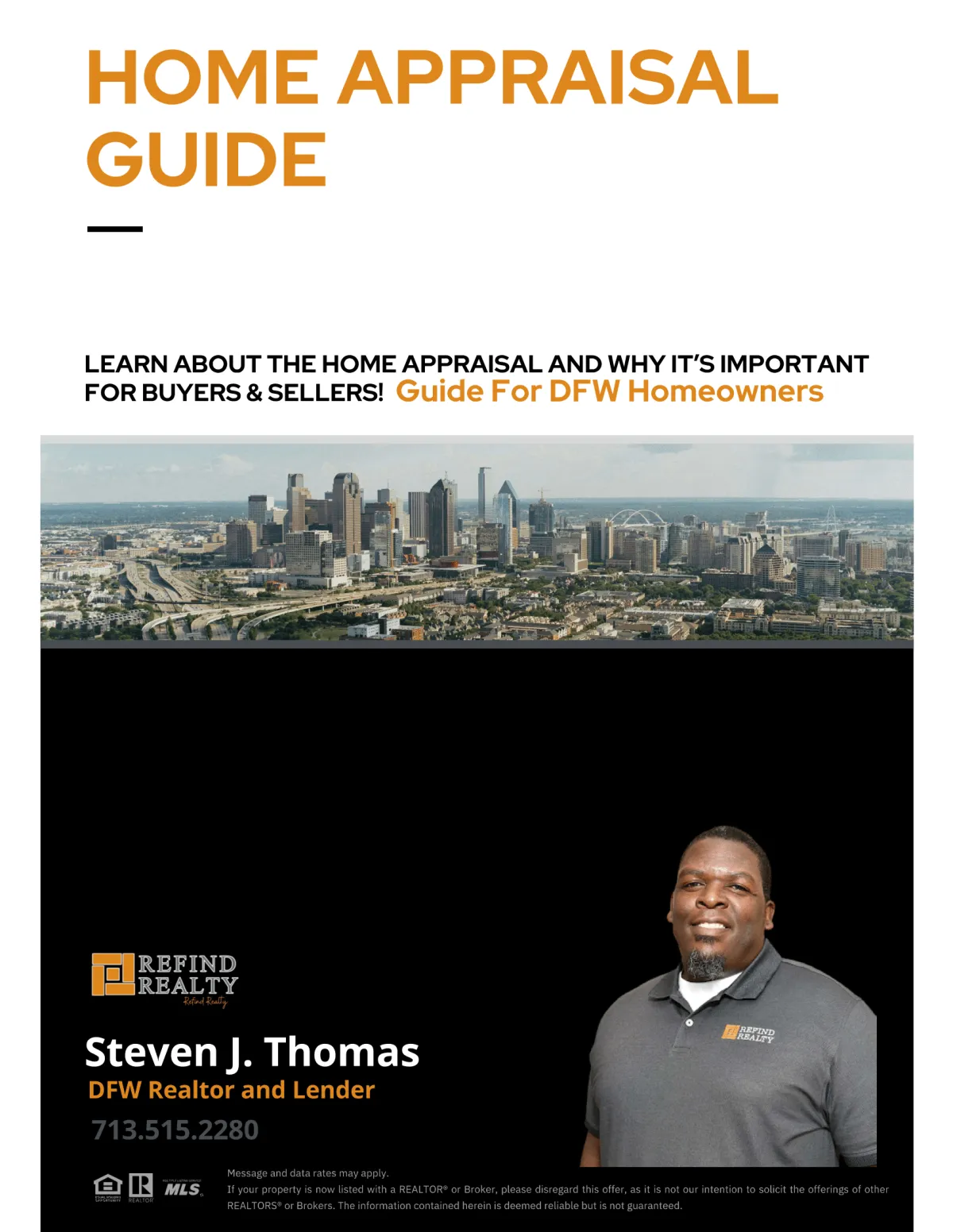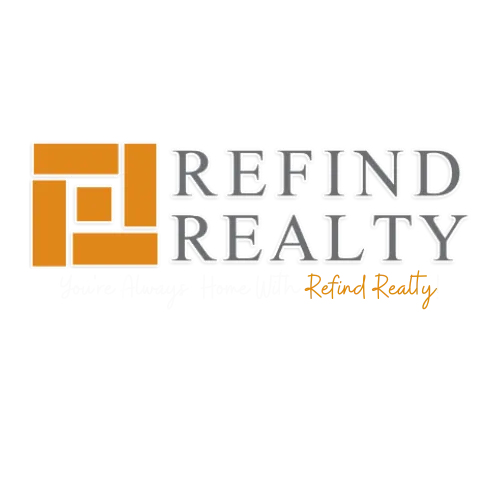You're Always At Home With Refind Realty.
Serving Your DFW Real Estate Needs Since 2005.
We Help You Buy and Sell in The Greater Dallas-Fort Worth Area.
Check Out Our Social Media Channels!
Buying in DFW
Buying your first or next home should be a rewarding and exciting time in your life, and one that you look back on with fond memories.
Thinking Of selling?
The market has changed a lot and I'd love to show you the exact strategy I use to get sellers in DFW top dollar for their property.
Get Pre-Approved
Let me walk you through the entire pre-approval process so you know exactly how much home you can afford.
We Help You Buy and Sell in The Greater Dallas-Fort Worth Area.
Check Out Our Social Media Channels!
Sign Up For my
Email List
My emails are a great way to stay up-to-date with local news and real estate market trends, even if you're not currently in the market. So, come on and join me to stay in the loop!
affordability Calculator
Get pre-approved to know exactly how much house you can afford. Use this calculator to get a quick estimate. Contact me for assistance!
DFW New Construction
Discover the latest new home constructions in DFW and take advantage of the builder incentives that are available now.
Let's Make Your real estate Dreams Come True.
Newest Listings
Call Me Today At (713) 505-2280

Refind Realty Blog:


Buying Your First Investment Property in Dallas–Fort Worth: 2025 Guide
Buying Your First Investment Property in Dallas–Fort Worth: 2025 Guide
Custom HTML/CSS/JAVASCRIPT
By Steven J. Thomas

Buying your first investment property can feel like a leap—but in Dallas–Fort Worth, 2025 may be one of the best times to get started. With strong rental demand, steady population growth, and new financing options, the market continues to offer opportunities for first-time investors. Here’s what you need to know to buy wisely and build long-term wealth.
Direct Answer
Yes, 2025 is a strong year to buy your first investment property in Dallas–Fort Worth. Steady population growth, strong rental demand, and new financing options make it attractive. Focus on neighborhoods with job hubs, reputable schools, and future development. Start by getting pre-approved and explore tools like the Lone Star Living App to track listings near your target area.
Neighborhood Spotlights: Where First-Time Investors Buy
Arlington
Arlington attracts investors for its steady rental base from the University of Texas at Arlington and major employers. Properties near AT&T Stadium and Texas Live! hold strong rental appeal. Explore neighborhood reports for Arlington to compare options.
Plano
Plano continues to perform thanks to high-income job centers like Legacy West and Toyota HQ. Families seek rentals near top Plano ISD campuses, giving investors consistent occupancy. Check your Home Wealth Report to gauge long-term growth here.
Fort Worth Alliance Corridor
With new construction homes and steady job growth from logistics and aerospace employers, this corridor is becoming a go-to for first-time investors. Consider using the Home Seller Score to measure neighborhood performance.
[Pro Tip: Use the Home Seller Score to evaluate location appeal and rental strength before you buy.]
Local Market Trends (Fall 2025)
As of September 2025:
Median Home Price: $414,000 (+2.3% YoY – Source: NTREIS/MLS, Sept 2025)
Average Days on Market: 38 days
Inventory: 3.1 months
Mortgage Rates: 6.4% (Source: Freddie Mac PMMS, Sept 2025)
“Investors should expect steady returns rather than quick flips in 2025,” says Dr. Luis Torres of the Texas A&M Real Estate Research Center. “Rental demand is strong, and appreciation will likely remain moderate but stable.”
Cost Breakdown for First-Time Investors
Down Payment: Typically 20–25% for investment loans
Closing Costs: ~2–4% of purchase price
Property Management: 8–10% of monthly rent if outsourced
Repairs & Maintenance: Budget $1,500–$3,000 annually
Positioning your rental competitively ensures higher occupancy and stable cash flow.
Builder & Community Insights: Know the Competition
New construction homes in McKinney, Prosper, and Mansfield are attracting investors who want low-maintenance rentals.
Builders like D.R. Horton, Lennar, and Highland Homes offer:
Builder warranties
Energy-efficient designs (lower utility costs for tenants)
Closing cost incentives
Leverage the new construction homes rebate program to offset upfront costs.
Financing & Incentives That Attract First-Time Investors
First-time investors often underestimate financing strategy. Get pre-approved early to understand your loan options, including:
Conventional investment loans
DSCR (Debt Service Coverage Ratio) loans
Portfolio loans from local banks
Work with a lender who understands Dallas–Fort Worth rentals. Get pre-approved now to see what you can comfortably afford.
Conclusion
Investing in your first Dallas–Fort Worth property in 2025 is about balance: choosing the right neighborhood, financing smartly, and understanding market dynamics. With steady rental demand, new construction incentives, and strong job growth, the region remains a great entry point for investors.
Start by reviewing your Home Seller Score, explore rebate programs for new construction, and track listings with the Lone Star Living App.
Download the Lone Star Living App to view available homes and track rental-ready listings near schools, parks, and job hubs. Book an appointment today to talk through your investment goals.
Key Takeaways
2025 is favorable for first-time investors in DFW.
Focus on high-demand rental corridors like Arlington, Plano, and Fort Worth Alliance.
Expect moderate appreciation and strong rental demand.
Use new construction rebates and builder incentives to your advantage.
Financing strategy is key—get pre-approved early.
FAQ: Buying Your First Investment Property in DFW
How much do I need for a down payment?
Most lenders require 20–25% for investment property loans.
Are rental properties still profitable in Dallas–Fort Worth?
Yes, steady rental demand from population and job growth supports cash flow in 2025.
Should I buy new construction or resale for my first rental?
New builds offer low maintenance and incentives, while resale may deliver better pricing.
How do I compete with experienced investors?
Leverage rebates, pre-approval, and tools like the Lone Star Living App to act fast.
Which areas of DFW are best for first-time investors?
Arlington, Plano, and the Fort Worth Alliance corridor all have strong rental bases.
Where can I track listings that work as rentals?
Download the Lone Star Living App now to find properties near job centers and schools.
Stay Informed With My Downloadable
Buyer and Seller guides

6 Smart Ways to Build Home Equity

7 Insider Secrets To Selling Your Home w/o a Lot of Time or Money

DFW Home Seller Negotiation Secrets

Home Appraisals Guide

Avoiding Pitfalls That Can Derail Your Home's Sale

Ultimate Guide To Buying a Home

A First Time Homebuyers Guide In DFW

Are You Ready To Buy?

25 Insider Secrets To Buying A Home

How to Improve Your Credit
Download All My Guides For Free
Unable to find form
(I'll send you all 10)

Refind Realty DFW
50+ 5 Star Reviews
Over $90,000,000 in Total Real Estate Sales
267+ Properties Sold

Wondering What Your DFW Home Could Be Worth in 2024?
Get a Professional Home Valuation From A Local Market Expert
Unlock insights into potential selling prices.
Get a personalized analysis sent directly to your inbox.
Stay ahead with updates on property value fluctuations.
Benchmark your property against neighborhood listings.
Get a FREE Home Valuation And Potential Net Sheet:
Unable to find form


Mr. Thomas real-estate company performed a outstanding job handling my transaction in buying my beautiful new home. I would recommend him to all my family and friends in the future.
{user.name}}


Steven was very knowledgeable about the questions I had and very attentive to my needs and wants of buying a house. His approach was as if he was buying the house for himself. That led me to trust his knowledge and expertise. Thomas for your next purchase of a home. He also worked with me every step of the process and helped me to understand and that made it less stressful In buying a home. I highly recommend Refind Realty and Steven On your first or next purchase. I start 2024 with a new build house with equity going in the door. Thank you Steven
{{user.name}}


Steve did a great job helping during this journey he was very communicative with everything and his response time was very quick every time we had a question. I really recommend him and his office to everyone who want any real state services.
{{user.name}}

Ask Us Anything
Frequently Asked Questions
Why do you need a Realtor?
When buying or selling a home, there are so many options…which can also present a lot of obstacles. Laws change, forms change, and practices change all the time in the real estate industry. Because it’s our job to stay on top of those things, hiring a realtor reduces risk, and can also save you a lot of money in the long run.
When you work with me as your Realtor, you’re getting an expert who knows the area; knows how to skillfully guide your experience as a seller or buyer; can easily spot the difference between a good deal and a great deal. My job is to translate your dream into a real estate reality, and I work hard to earn and keep my business. This also means earning your trust: When you work with me, you’ll be working with a realtor who looks out for your best interests and is invested in your goals.
Which loan should you choose?
There are two different types of loans conventional loans and government-backed loans. The main difference is who insures these loans:
1 - Government-backed loans (FHA, VA and USDA):
(a) - Are, unsurprisingly, backed by the government.
(b) - Include FHA loans, VA loans, and USDA loans.
(c) - Make up less than 40 percent of the home loans generated in the U.S. each year.
2 - Conventional loans
(a) - Are not backed by the government.
(b) - Include conforming and non-conforming loans (such as jumbo loans).
(c) - Make up more than 60 percent of the loans generated in the U.S. each year.
What is the difference between FHA, VA and USDA loans?
1 - FHA LOANS:
FHA loans, which are insured by the Federal Housing Administration, are typically designed to meet the needs of first-time homebuyers with low or moderate incomes. FHA loans can be approved with a down payment of as little as 3.5 percent and a credit score as low as 580.
FHA loans are often called “helper loans,” because they give a leg up to potential borrowers who may not be able to secure one otherwise. For this reason, FHA loans have maximum lending limits, which are determined based on housing values for the county where the for-sale home is located.
Because the agency is taking on more risk by insuring FHA loans, the borrower is expected to pay mortgage insurance both at the time of closing and on a monthly basis, and the property must be owner-occupied.
2 - VA LOANS:
VA loans are backed by the Department of Veterans Affairs and they are guaranteed to qualified veterans and active-duty personnel and their spouses. VA loans can be approved with 100 percent financing, meaning VA borrowers are not required to make a down payment.
Unlike FHA loans, borrowers do not have to pay mortgage insurance on VA loans.
3 - USDA LOANS:
You may also hear about USDA loans, which are backed by the United States Department of Agriculture mortgage program. USDA loans are intended to support homeowners who purchase homes in rural and some suburban areas. USDA loans do not require a down payment and may offer lower interest rates; borrowers may have to pay a small mortgage insurance premium in order to offset the lender’s risk.
What’s a conventional loan? Understanding what it means to be conforming and non-conforming
Buyers who have a more established credit history and a larger down payment may prefer to apply for a conventional loan. These loans may offer a lower interest rate and only require the home buyer to purchase monthly mortgage insurance while the loan-to-value ratio is above a certain percentage, so a conventional loan borrower can typically save money in the long run.
Conventional loans are divided into two types: Conforming loans and non-conforming loans.
1 - CONFORMING LOANS:
Conforming loans are those that meet (or conform to) predetermined standards set by Fannie Mae and Freddie Mac — two government-sponsored institutions that buy and sell mortgages on the secondary market. By selling the loans to "Fannie and Freddie," lenders can free up their capital and return to issue more mortgages than if they had to personally back every loan that they approve.
The main standard for conforming loans is that the amount borrowed must be under a certain amount; in Alaska, a single-family home loan must be under $647,200 in order to be considered conforming.
Properties with more than one unit have higher limits.
2 - NON-CONFORMING (JUMBO) LOANS:
But what happens if a borrower wants to borrow more than the Freddie- and Fannie-approved loan amount? In this case, they would have to apply for a “jumbo loan,” which is the most common type of non-conforming loan.
Because the lender cannot resell the jumbo loan (or any non-conforming loan) to Freddie Mac or Fannie Mae, jumbo loans are considered to be riskier than a conforming loan. To protect against this risk, the bank will typically require a higher down payment; the interest rate on a jumbo loan may also be higher than if the same borrower applied for a conforming loan.
What kind of rate should you choose?
Rate types: Fixed-rate vs. adjustable-rate mortgages.
In addition to the loan type you choose, you’ll also have to determine if you want a fixed-rate mortgage or an adjustable-rate mortgage (ARM). A fixed-rate mortgage has an interest rate that does not change for the life of the loan, so it provides predictable monthly payments of principal and interest.
An adjustable-rate mortgage typically offers an initial introductory period with a low-interest rate. Once this period is over, the interest rate adjusts periodically, based on the market index. The initial interest rate on an ARM can sometimes be locked in for different periods, such as one, three, five, seven, or 10 years. Once the introductory period is over, the interest rate typically readjusts annually.
Office 1229 E. Pleasant Run Ste 224, DeSoto TX 75115
Call :(713) 505-2280
Email: [email protected]
Site: www.stevenjthomas.com


Facebook
Instagram
X
LinkedIn
Youtube
TikTok